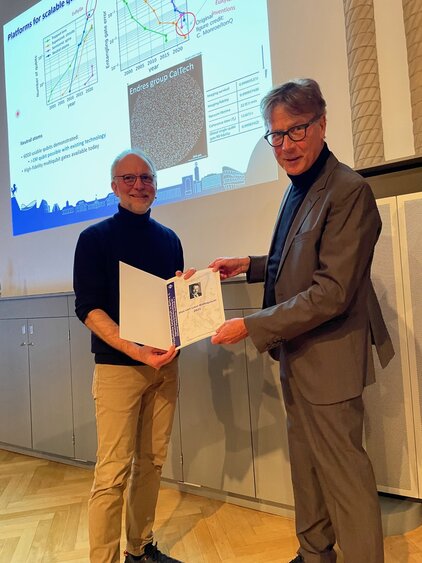Das Max-von-Laue-Kolloquium
Das Max-von-Laue-Kolloquium der Physikalischen Gesellschaft zu Berlin setzt eine alte Berliner Kolloquiums-Tradition fort, die auf das im Jahre 1843 gegründete Physikalische Kolloquium im Magnus-Haus zurückgeht, aus dem 1845 die Physikalische Gesellschaft zu Berlin hervorging. Aus dem alten Kolloquium im Magnus-Haus wurden die Kolloquien der Friedrich-Wilhelms-Universität in Berlin und der Physikalischen Gesellschaft zu Berlin, und diese Reihe setzte sich in der DDR fort, wo die Physikalische Gesellschaft der DDR zusammen mit der Akademie der Wissenschaften und der Humboldt-Universität zu Berlin Max-von-Laue-Kolloquien veranstaltete.
Um eine Anmeldung per E-Mail an besichtigungen@pgzb.de wird gebeten.
In diesem Max-von-Laue-Kolloquium spricht
Prof. Dr. Tilman Pfau,
Universität Stuttgart.
Titel: Giant Rydberg Atoms: From Monster Molecules to Quantum Computing
Im Anschluss an das Kolloquium findet ein Stehempfang auf der Galerie des Hermann-von-Helmholtz-Baus statt.
Zeit
Ort
Abbestraße 2–12
Moderation
Sprecher:innen
- Prof. Dr. Tilman Pfau
Dateien
Zusammenfassung
Highly excited atoms named after Janne Rydberg have played an important role throughout the history of atomic physics. This is because they have extreme properties, mostly because of their size, which scales like n2. Here n is the principle quantum number. In our lab we can excite and control Rydberg atoms up to n>200, which means that the electron obits can have a diameter as large as 8 micrometers. At the same time they can be ultracold such that very weak effects give rise to novel bound states, which are based on binding mechanisms which are not discussed in a standard chemistry text book. We discuss two examples of such mechanisms and can directly measure the structure and the dynamics of these “monster molecules” under an ion microscope. The extreme properties of Rydberg atoms also include their strong mutual interaction. This giant interaction is the key to conditional gate operations, which is the basis for neutral atom based quantum computing, which we will discuss briefly as an outlook.


